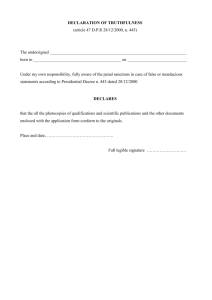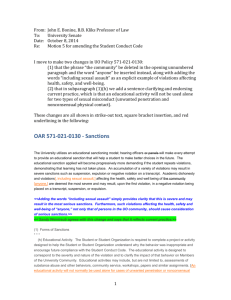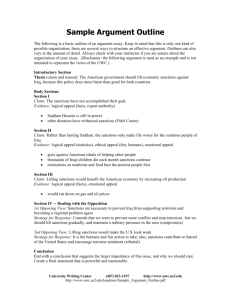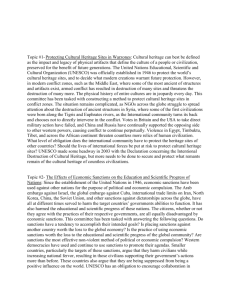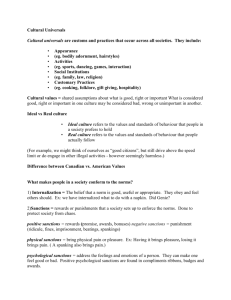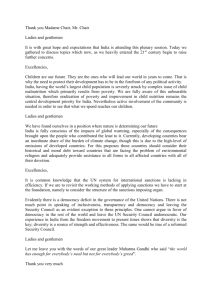Deterrence NC 3
advertisement
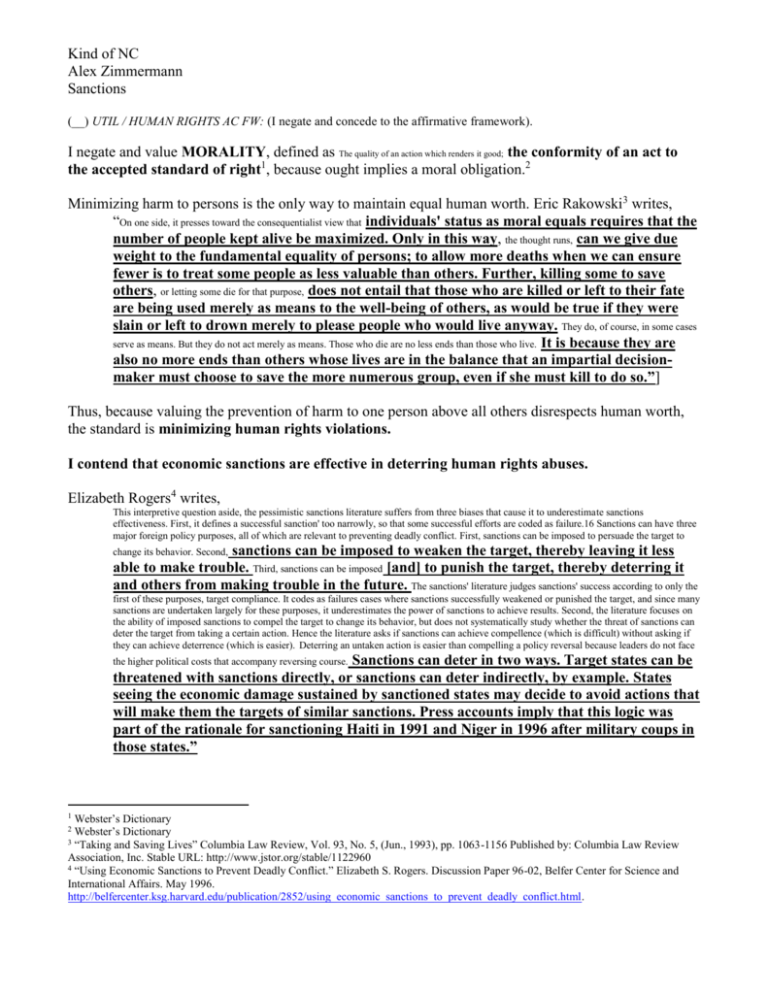
Kind of NC Alex Zimmermann Sanctions (__) UTIL / HUMAN RIGHTS AC FW: (I negate and concede to the affirmative framework). I negate and value MORALITY, defined as The quality of an action which renders it good; the conformity of an act to the accepted standard of right1, because ought implies a moral obligation.2 Minimizing harm to persons is the only way to maintain equal human worth. Eric Rakowski 3 writes, “On one side, it presses toward the consequentialist view that individuals' status as moral equals requires that the number of people kept alive be maximized. Only in this way, the thought runs, can we give due weight to the fundamental equality of persons; to allow more deaths when we can ensure fewer is to treat some people as less valuable than others. Further, killing some to save others, or letting some die for that purpose, does not entail that those who are killed or left to their fate are being used merely as means to the well-being of others, as would be true if they were slain or left to drown merely to please people who would live anyway. They do, of course, in some cases serve as means. But they do not act merely as means. Those who die are no less ends than those who live. It is because they are also no more ends than others whose lives are in the balance that an impartial decisionmaker must choose to save the more numerous group, even if she must kill to do so.”] Thus, because valuing the prevention of harm to one person above all others disrespects human worth, the standard is minimizing human rights violations. I contend that economic sanctions are effective in deterring human rights abuses. Elizabeth Rogers4 writes, This interpretive question aside, the pessimistic sanctions literature suffers from three biases that cause it to underestimate sanctions effectiveness. First, it defines a successful sanction' too narrowly, so that some successful efforts are coded as failure.16 Sanctions can have three major foreign policy purposes, all of which are relevant to preventing deadly conflict. First, sanctions can be imposed to persuade the target to sanctions can be imposed to weaken the target, thereby leaving it less able to make trouble. Third, sanctions can be imposed [and] to punish the target, thereby deterring it and others from making trouble in the future. The sanctions' literature judges sanctions' success according to only the change its behavior. Second, first of these purposes, target compliance. It codes as failures cases where sanctions successfully weakened or punished the target, and since many sanctions are undertaken largely for these purposes, it underestimates the power of sanctions to achieve results. Second, the literature focuses on the ability of imposed sanctions to compel the target to change its behavior, but does not systematically study whether the threat of sanctions can deter the target from taking a certain action. Hence the literature asks if sanctions can achieve compellence (which is difficult) without asking if they can achieve deterrence (which is easier). Deterring an untaken action is easier than compelling a policy reversal because leaders do not face Sanctions can deter in two ways. Target states can be threatened with sanctions directly, or sanctions can deter indirectly, by example. States seeing the economic damage sustained by sanctioned states may decide to avoid actions that will make them the targets of similar sanctions. Press accounts imply that this logic was part of the rationale for sanctioning Haiti in 1991 and Niger in 1996 after military coups in those states.” the higher political costs that accompany reversing course. Webster’s Dictionary Webster’s Dictionary 3 “Taking and Saving Lives” Columbia Law Review, Vol. 93, No. 5, (Jun., 1993), pp. 1063-1156 Published by: Columbia Law Review Association, Inc. Stable URL: http://www.jstor.org/stable/1122960 4 “Using Economic Sanctions to Prevent Deadly Conflict.” Elizabeth S. Rogers. Discussion Paper 96-02, Belfer Center for Science and International Affairs. May 1996. http://belfercenter.ksg.harvard.edu/publication/2852/using_economic_sanctions_to_prevent_deadly_conflict.html. 1 2 Kind of NC Alex Zimmermann Sanctions Finally, Ioana Petrescu5 quantifies the impact of sanctions deterrence on military conflict using a study of 2331 militarized interstate disputes between the years 1816 and 2001 The central intuition is that economic sanctions imposed on countries involved in militarized conflicts show sender’s disapproval of militarized conflicts and a willingness to impose economic costs on similar countries involved in militarized conflicts. Thus, [others], countries that were sanctioned due to their involvement in a militarized dispute, countries that took part in the sanctioned dispute or countries similar to the ones in are less likely to participate in future disputes because they try avoiding the economic and political costs associated with economic sanctions. This study finds that economic sanctions decrease the probability that a country in the militarized dispute will participate in another dispute by 9%. The marginal effect of economic sanctions is negative and significant only if the sanction is the sanctioned dispute multilateral and if the sender bears some economic costs as a result of the sanction. The effect of economic sanctions is stronger when the target economic sanctions make countries similar to the ones in the sanctioned dispute less likely to the probability that [countries with similar military capabilities]Mi will participate in another dispute by 12%, that Di [countries with a similar democratic system] will participate in another dispute by 5% and that Gi [countries in the same geographic area] will participate in another dispute by 11%. Finally, the cost is larger. Then, the paper finds that participate in other militarized disputes in the future. Sanctions decrease study finds that decreasing trade and aid to a country involved in a militarized dispute without imposing economic sanctions have no effect on the future military behavior of this country. This outweighs the AC because a) in the long term, repressive and objectionable policies stop before they even exist when nations attempt to avoid the use of sanctions; and b) because the benefits of sanctions extend beyond a specific nation to all other nations who are considering adopting undemocratic policies. Sanctions thus change objectionable policies without harming innocents in the target country. 5 Ioana Petrescu [Ioana M. Petrescu is a National Research Initiative Fellow at AEI. Ms. Petrescu conducts research on economic sanctions, especially the deterrent effect of sanctions, as well as their impact on health.] “Rethinking Economic Sanction Success: Sanctions as Deterrents” The American Enterprise Institute. April 17, 2008. http://www.aei.org/docLib/111009sanctions.pdf


